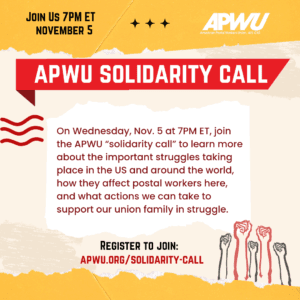July 24, 2014
Postal Banking: An Urgent Public Need
Nearly 150 Convention delegates attended the Postal Banking Forum on Wednesday after the convention adjourned.
The session, moderated by Eastern Region Coordinator Mike Gallagher, included Denis Lemelin, president of the Canadian Union of Postal Workers; Jose Sayagues, federal secretary of the Spain FSP-UGT Postal Sector; Jose Oliveira, international relations secretary of the National Union of Postal and Telecommunication Workers, in Portugal; and Ariel Yacobi, chairman of the Israel Union of Government Employees.
The panel spoke about the history of postal banking in their countries and how public banking meets the needs of low-wage workers.
In 2012, Canadian Union of Postal Workers initiated a new campaign based on Canada Post’s research that highlighted the fact that low income and aboriginal people are lacking banking services and subject to 1,350 payday lenders who drain more than two billion dollars a year from the people.
In Spain, 10% of people are unable to get credit and 5% are not able to open a bank account. “Postal workers can do the same job or better than the banking sector,” said Sayagues. And to the APWU, “Your success will be our success as well.”
Ariel Yacobi argued that the public post office must provide social needs and services. In Israel, 25% have a need for access to banking services.
While Israel Post is currently operating a public bank, the country’s commercial banks are fighting to privatize the service and split banking operations from the mail.
Jose Oliveira said, “ I do not wish for the APWU to experience the same situation we have in Portugal.”
The Portuguese Postal Service has had 70% of its offices privatized. At one time, they had a State Savings Bank and even paid pension funds through postal networks.
Oliveira urged the APWU to “fight for a postal bank and to resist privatization with all of your forces.”
President Dimondstein opened the forum by reiterating the importanance of postal banking to the APWU and the American people. He noted that low-income workers often spend over 10% of their income on fees and services when forced to use payday lenders.
The need for such a service is supported by the fact that almost one quarter of the population lives outside the financial mainstream. Sixty-eight million American adults do not have bank accounts or have limited access to financial services. These families pay $89 billion in interest and fees, negatively impacting their well being.
The USPS Office of the Inspector General issued a ‘white paper’ in January 2014, that argued the USPS should provide basic financial services. The report endorsed the idea postal unions have supported for years. APWU research indicates that with more than 35,000 post offices, stations and branches – located in every city and town in America – the Postal Service has the infrastructure to provide the desperately needed services.
Thirty-eight percent of USPS retail offices are in ‘bank deserts’ – zip codes with no banks; another 21 percent of zip codes serve communities with just one bank.
Senator Elizabeth Warren (D-MA) has offered her support for postal banking, writing, “If the Postal Service offered basic banking services – nothing fancy, just basic bill paying, check cashing and small dollar loans – then it could provide affordable financial services for underserved families, and, at the same time, shore up its own financial footing.”
Senator Warren’s support is important, but the APWU will not pursue a legislative strategy to achieve postal banking. Instead, the union will lead a grassroots campaign aimed at the Postmaster General.
“The Postal Service would better serve the needs of potential customers – and the nation – because it won’t victimize customers,” President Dimondstein has said regarding the fact that the USPS is consistently rated one of the most trusted public institutions.



